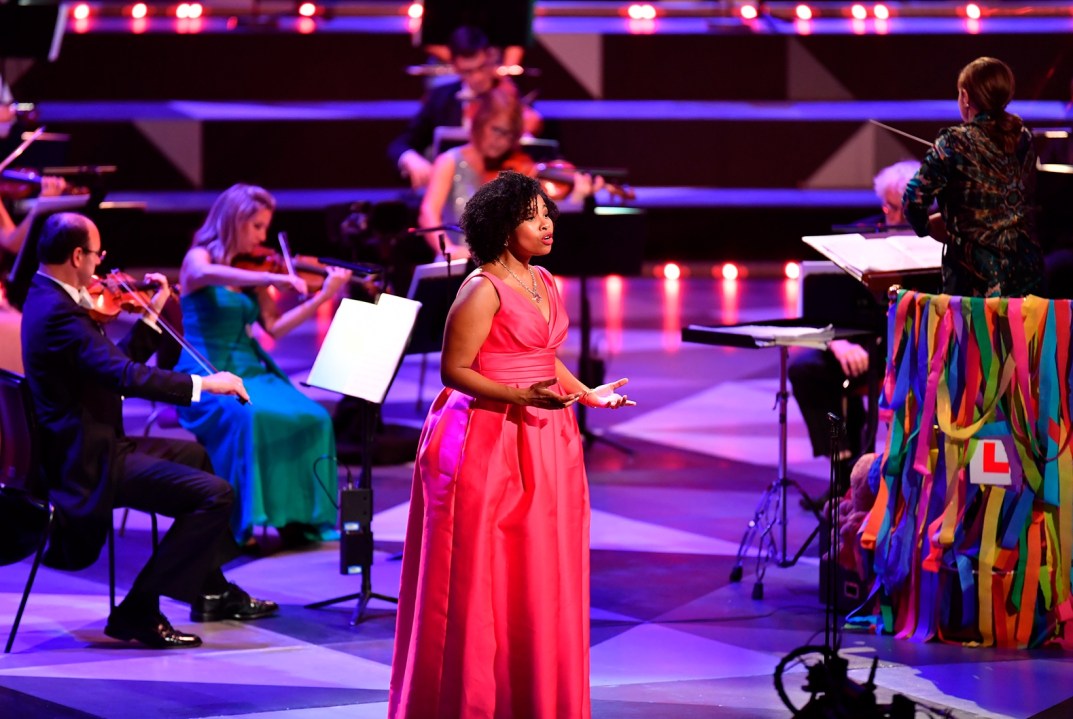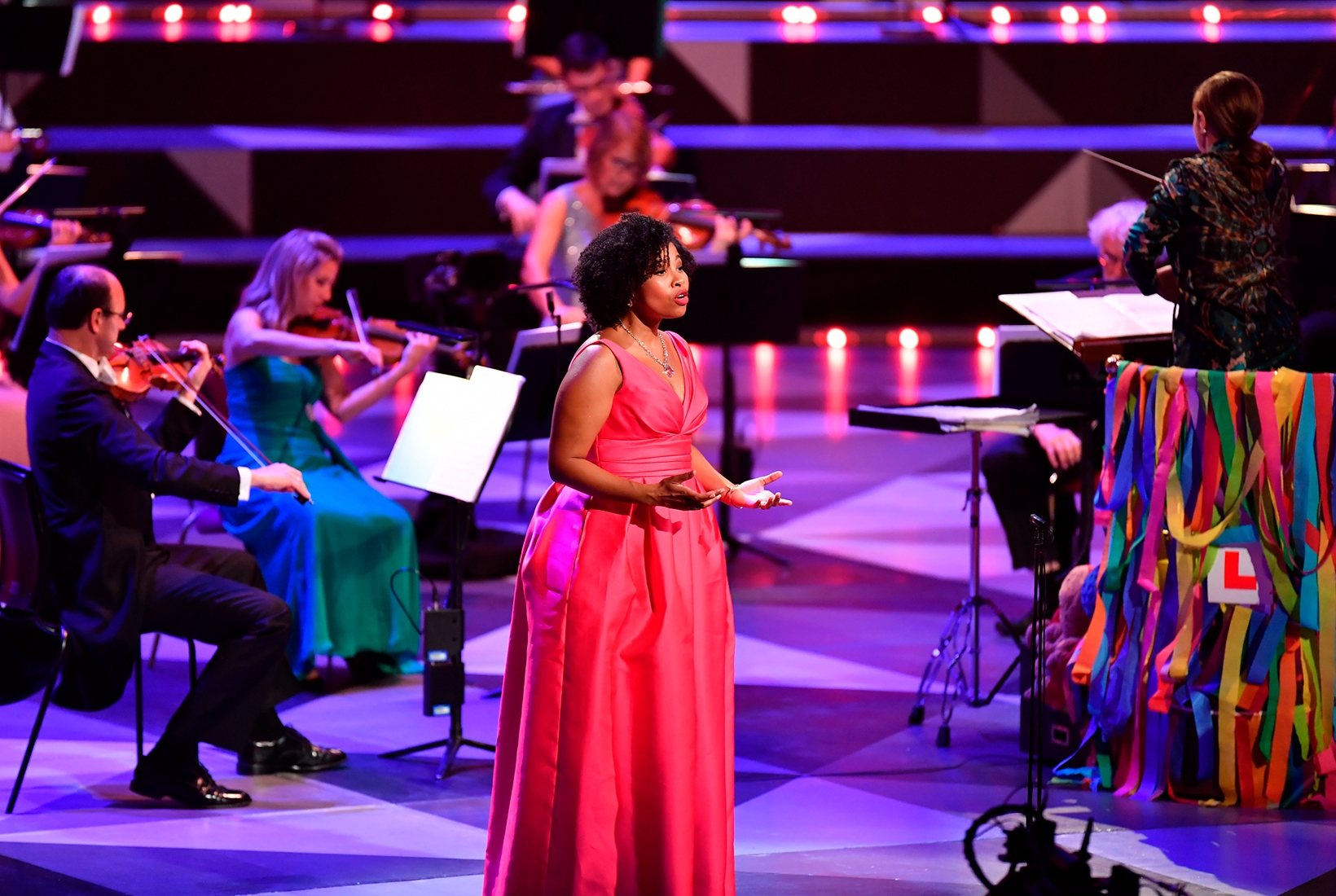The Last Night of the Proms came and went, and it was pretty much as anyone might have predicted, if they’d given it a moment’s thought. A sprinkling of popular classics, a pair of unthreatening premières, the familiar landmarks tastefully and affectionately done, and some show tunes and arias, sung by the soprano Golda Schultz with a generosity and warmth that couldn’t have been more potent if she really had been singing to a packed and cheering Royal Albert Hall, rather than TV cameras and emptiness. It was recognisably a Last Night of the Proms: celebratory in that slipper-wearing BBC way, without ignoring the unavoidable truth that you can’t have audience participation without an audience.
And after all that fuss, too. Social media gives all arguments a sharper, meaner edge, but the annual stramash over the Last Night is a fixture dating back at least a quarter of a century to 1995, when John Drummond decided to wind up the normies by commissioning Harrison Birtwistle’s Panic. You know the script: in late August, someone at the Corporation drops a juicy scrap of Daily Mail bait, carefully hedged with plausible deniability. The resulting faux-outrage ricochets tinnily around the media until the concert itself feels like an anti-climax — which might, of course, be the point. It’s a silly season page-filler, probably best experienced at this stage as a Proms tradition in its own right. If you’re at all inclined to take it seriously, you probably need to lie down somewhere dark with a wet flannel on your head, and think hard about your life choices.
The annual stramash over the Last Night is probably best experienced as a Proms tradition in its own right
Still, it’d be healthy to see it quietly de-escalated; if only for the sake of the blameless musicians — such as this year’s conductor Dalia Stasevska — who by all accounts found themselves implicated in a row whose protagonists on left and right showed no great interest in the rest of the curtailed Proms season. Which — despite its obvious limitations — actually served as quite a useful showcase for the current state of the BBC’s orchestras. I wrote last week about the superlative playing of the BBC Scottish Symphony Orchestra, and nothing I’ve heard in the past fortnight has disproved what you’ll hear, unofficially, from every conductor in a position to know: that right now, they’re the absolute cream of the crop.
But the BBC National Orchestra of Wales made a fine showing too, under its new principal conductor Ryan Bancroft. It’s always nice to hear a bit of Martinu, whose Jazz Suite follows the standard 1920s European modernist prescription for ‘jazz’: basically anything with syncopation and muted trumpets. It was fun, and Bancroft and his downsized band clipped smartly round its right angles and primary colours. Bancroft has a knack for clarifying different strands of orchestral sound. ‘Roadrunner’, the delirious finale of John Adams’s Chamber Symphony, developed into a glittering high-speed tightrope act. He made the watercolour tenderness of Samuel Barber’s Knoxville: Summer of 1915 glow from within, while soprano Natalya Romaniw earnestly, unaffectedly laid down James Agee’s words. A class act.
Getting back to the Last Night, Errollyn Wallen’s Jerusalem – Our clouded hills was an enjoyable concert fantasy on the famous song, with a tumultuous orchestral commentary that paid oblique homage to Elgar’s famous arrangement (too big, apparently, for a socially distanced orchestra). Wallen did insert some lines about the Commonwealth (I couldn’t discern the exact words), and coming from a composer who is a Commander of the Most Excellent Order of the British Empire, I don’t see how any Spectator reader could quarrel with that. (We got Parry’s choir-and-organ original later, anyway.) Even the dreariest wokester, meanwhile, can presumably enjoy displays of national pride as long as they aren’t British. Stasevska’s cool, eloquent reading of the Impromptu for strings by her compatriot Sibelius floated in the empty hall like an autumn mist.
More puzzling was Elgar’s Pomp and Circumstance March No. 1: billed as a new arrangement by Anne Dudley. But practically every performance of this piece is re-arranged in one way or another (at least, I’ve never seen it done with the two harps that Elgar stipulated), and in any case, rejigging the score to omit a couple of percussionists or brass is the kind of job that could be done by any orchestral librarian with a 2B pencil during lunch break. On one listening, Dudley’s alterations were mostly inaudible. So why bother? Dudley is an excellent composer who has never been performed at the Proms. Why not programme one of her original compositions?
Anyway, the Elgar was duly played, with the BBC Singers adding the words. And then a delegation of BBC diversity officers ascended the stage and ritually toppled the bust of Sir Henry Wood, in overdue atonement for his crimes against 21st-century sensibilities. Only kidding. That’s for next year, once they’ve done the risk assessments.






Comments